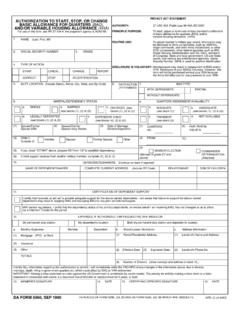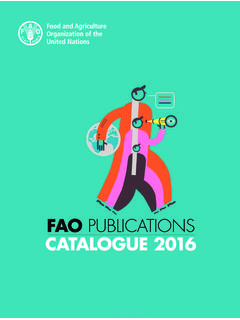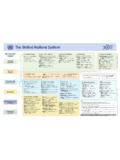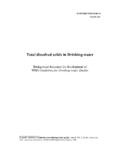Transcription of Financing Water For All - OECD
1 Financing Water For AllReport of the World Panel onFinancing Water InfrastructureWORLDWATERCOUNCIL3 RDWORLDWATERFORUMGLOBALWATERPARTNERSHIPC HAIRED BYMICHELCAMDESSUSREPORT WRITTEN BYJAMESWINPENNYAs one of the Millennium Development Goals, by 2015 all United Nations Member States have pledged to:Reduce by half the proportion of people without sustainable access to safe drinking the Johannesburg Earth Summit it was further agreed, by 2015, to:Reduce by half the proportion of people without access to basic 2003 ISBN 92-95017-01-3 Abbreviations and acronymsivForewordvAcknowledgementsviThe panel s mandate, composition and modus operandiviiList of panel members and othersix1.
2 Landmarks in the evolution of a consensus1 International targets2 Financing requirements2 Financial initiatives32. Brief status report on infrastructure and financing5 Trends in funding for investment in water6 Private or public Water operators?7A ray of hope83. Roots of the problem9 Governance9 Specific risks of the Water sector10 Country risk and project size114. Proposals13 General orientations13 Water governance and sector reform14 Financial instruments and facilities22 Implementing the proposals: a three-phase strategy355. Conclusions: Priorities, actions and impacts37 Priorities37 Actions required from main parties37 Impacts on the main sub-sectors38 Annex 1.
3 The Devaluation Liquidity Backstopping Facility41 Annex 2. The African Development Bank proposal for a Rural Water Supply and Sanitation Initiative43 Annex 3. Full list of panel proposals47 Endnotes53 Table of contentsiiiAFDA gence Fran aise de D veloppementAfDBAfrican Development BankAsDBAsian Development BankBOOB uild Own Operate contractBOOTB uild Own Operate Transfer contractCDCC ommonwealth Development CorporationDACD evelopment Assistance Committee (of the OECD)DBFOD esign Build Finance Operate contractEBRDE uropean Bank for Reconstruction & DevelopmentEIBE uropean Investment BankEUEuropean UnionFAOUN Food and Agriculture OrganisationGWPG lobal Water PartnershipIADBI nter-American Development BankIFCI nternational Finance CorporationIWIRMI ntegrated Water Resource ManagementJBICJ apanese Bank for International CooperationKfWKreditanstalt fur WiederaufbauMDGM illennium Development GoalMFIM ultilateral financial institutionMIGAM ultilateral Investment Guarantee AgencyNGONon-governmental
4 OrganizationO&MOperating and maintenenceOBAO utput-based aidODAO fficial development assistanceOECDO rganization for Economic Cooperation and DevelopmentOPICO verseas Private Investment CorporationPPPP ublic-Private PartnershipPSPP rivate Sector ParticipationRDBR egional Development BankSCRS ustainable cost recoverySSPWPS mall-scale private Water providerWWCW orld Water Counciliv Financing Water For AllAbbreviations andacronymsATTHE START OF THETHIRDMILLENNIUM, MORE THAN ONEperson in three in the world suffers hardship andindignity from the problem of Water .
5 This person ismuch more often a woman than a man. This injustice islargely unspoken and one of the most difficult to rectify, pre-cisely because it is above all an injustice to women. Its rootcause is our negligence and our resignation in the face ofinequality. Yet while over the next fifty years more than halfof mankind is threatened by Water stress , the dream ofpure Water for all continues to unite humanity. The groupwhose report I present here is witness to the remarkable workof the many men and women who are striving to realise was not our task to philosophise about this drama.
6 Rather,coming after all the work done on the technical aspects ofthe problem, our remit was to explore its financial aspects,seemingly for the first time. Against the background of theMillennium celebrations and the Johannesburg EarthSummit, all the member states of the United Nations are com-mitted, by 2015, to reducing by half the proportion of theworld s population without access to Water and main task has been to indicate the financial means forachieving is the aim of the pages that follow. They are the fruit ofthe work of a group of men and women from diverse back-grounds.
7 They have put all their resources, commitment, abil-ity and experience into this work. The most difficult thing forthem as it is for me now has been to draw the work to itsend, since time is upon us. Our feeling is that we are far fromhaving plumbed the depths of the problem, and we have hadto confine ourselves to exploring what has to be done withinthe limits of our available resources. We have not been ableto call upon any single specialised institution, since amongstinternational organisations Water this vital good is sur-prisingly an orphan.
8 Much of the information needed todefine a strategy is still missing. For all its limitations, the report brings a key message. Thedream of pure Water for all is within the reach of can be attained by continuing for a further ten years theeffort to which we are committed from now to 2015. This isthe challenging task for the generation of people now run-ning the world!This effort must involve all parties acting together, since inthe past they have too often tended to shift responsibilitiesto each other. The problem needs tackling at a global level,and can only be solved if all the various parties accept theneed to change their approach, in some cases radically.
9 Thisapplies not just to governments in the North and South butalso to towns, regions, nongovernmental organisations, com-munities, civil society, public services, companies, banks, mul-tilateral organisations and others, each of which mustredouble its flows, our main concern, need to at least will have to come from financial markets, from waterauthorities themselves through tariffs, from multilateralfinancial institutions, from governments, and from publicdevelopment aid, preferably in the form of grants. How couldit be otherwise?
10 This is basically a question of giving ourbrothers and sisters what they need to drink. The UniversalDeclaration of the Rights of Man, in its first article, sets eachperson the overriding duty of acting towards others in aspirit of fraternity .This doubling, or more, of the volume of finance has notdaunted our group. We see it as an indispensable investmentif humanity wants to achieve its other aims for health, uni-versal primary education above all of girls and reducingabsolute poverty by half between now and 2015.













